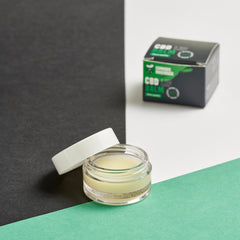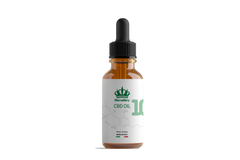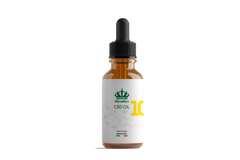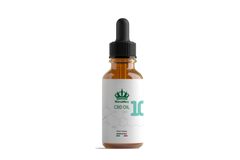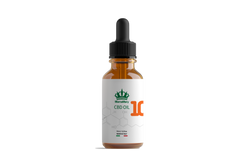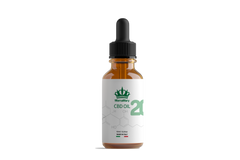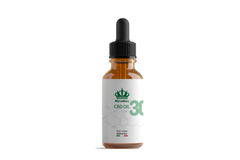CBD and Menopause: How Cannabidiol Can Ease Symptoms

Menopause is a natural transition in a woman's life, characterized by several symptoms that can affect her quality of life. Recently, interest in cannabis, and in particular CBD (cannabidiol), as a treatment to relieve the symptoms of menopause, has grown significantly. In this article, we explore the potential of CBD and cannabis in managing menopause-related symptoms, analyzing benefits, methods of use, and how the endocannabinoid system works.
What is menopause and what are the main symptoms?
Menopause marks the end of the menstrual cycle and can be considered officially begun when a woman has not had a period for 12 consecutive months. During this period of life, many women experience symptoms related to hormonal changes.
The main symptoms of menopause include hot flashes, sleep disturbances, irritability, joint pain, and decreased bone density. These menopause-related symptoms vary in intensity and duration, making personalized management a priority to improve women's quality of life.
The role of the endocannabinoid system during

The endocannabinoid system is a complex network of receptors and molecules that helps maintain balance in the body. During menopause, the endocannabinoid system can play a crucial role in managing symptoms related to hormonal changes.
Receptors like CB1 and CB2, found in the brain and immune system, interact with cannabinoids, including those produced by the body and those derived from the cannabis plant. This interaction may help regulate mood, bone density, pain, and inflammation.
How does hemp work during menopause? A help for sleep disorders, hot flashes and hormonal changes
CBD, one of the main cannabinoids found in the cannabis plant, acts indirectly on receptors in the endocannabinoid system. Because CBD is non-psychoactive, it offers therapeutic benefits without the side effects typical of THC.
During menopause, CBD may help reduce anxiety and irritability, improve sleep quality, and relieve joint pain. It may also help maintain bone health since estrogen, which decreases during menopause, is essential for bone density.
Menopause and CBD: Can Cannabidiol Alleviate Menopause Symptoms?
CBD can help manage a number of symptoms related to menopause:
1. Hot Flashes : Although evidence is limited, many women report relief from the calming effects of CBD.
2. Sleep disturbances : Insomnia is common during menopause. CBD can improve the quality of sleep, helping to relax the mind and body.
3. Joint Pain and Inflammation : Due to its anti-inflammatory properties, CBD may relieve joint and muscle pain often associated with menopause.
CBD and Hormones: Is There a Connection?
Menopause is characterized by a dramatic drop in estrogen, which can affect many bodily functions. Although CBD does not interact directly with estrogen, it may modulate the endocannabinoid system to offset some of the negative effects of the loss of these hormones.
Additionally, preliminary studies suggest that CBD may help maintain hormonal balance, thereby reducing menopause-related symptoms such as mood swings and irritability.
Medical Cannabis and Menopause: When Can It Be Useful?

Medical cannabis, which contains both THC and CBD, may be an option for women who experience severe symptoms. THC, found in cannabis sativa strains, may provide immediate pain relief, while CBD mitigates the psychoactive effects of THC, improving the safety profile of the treatment.
How to take CBD during menopause?
CBD can be taken in a variety of forms, including CBD oils, capsules, topicals, and sublingual CBD products. Each formulation offers specific benefits:
• CBD oils are easy to dose and work quickly.
• Topical products may be helpful for localized joint pain.
• Capsules offer precise dosing and discreet administration .
CBD use should start with a low dosage, gradually increasing until the desired effects are achieved.
Is CBD Safe During Menopause?
CBD is generally considered safe, but it is essential to purchase high-quality products from reputable sources. Side effects are rare and include dry mouth, drowsiness, or changes in appetite.
It is essential to consult a doctor before starting a CBD treatment, especially if you are taking other medications. This will help avoid potential drug interactions.
Cannabis and menopause: what do the studies say?
Research on cannabis and menopause is still in its early stages, but preliminary studies have shown that CBD may help manage menopause symptoms through its ability to interact with the endocannabinoid system.
Additionally, many women have stated that cannabis could be a valid alternative or complement to hormone replacement therapy. However, it is important to emphasize that cannabis-based treatments are not suitable for everyone and require a medical evaluation.
Cannabis and Bone Health: Can CBD Help?
One of the main problems associated with menopause is the loss of bone density, which increases the risk of osteoporosis. Preliminary studies suggest that CBD may help maintain bone health by influencing receptors in the endocannabinoid system involved in bone metabolism.
In combination with a balanced diet and regular physical activity, CBD may be a useful addition to protect bone health during and after menopause.
Bottom Line: Can CBD Improve the Quality of Life of Women in Menopause?

CBD is a promising option for alleviating symptoms of menopause, including hot flashes, sleep disturbances, and joint pain. Because CBD works through the endocannabinoid system, it may help restore balance in women's bodies during this transition.
Although scientific evidence is still limited, many women have reported significant improvements in their quality of life thanks to the use of CBD. Consulting a doctor who is experienced in medical cannabis is the first step in exploring this option and finding the most suitable treatment.






